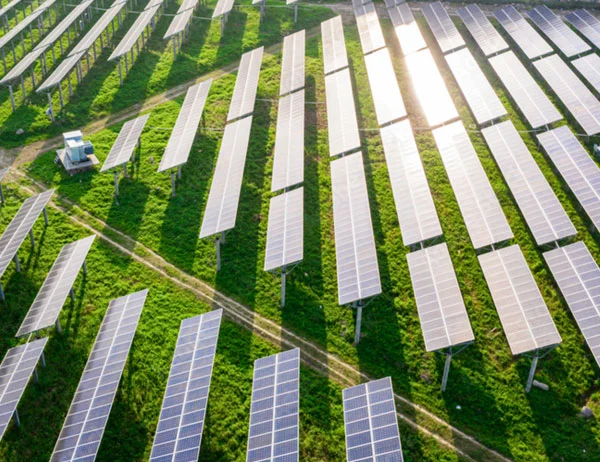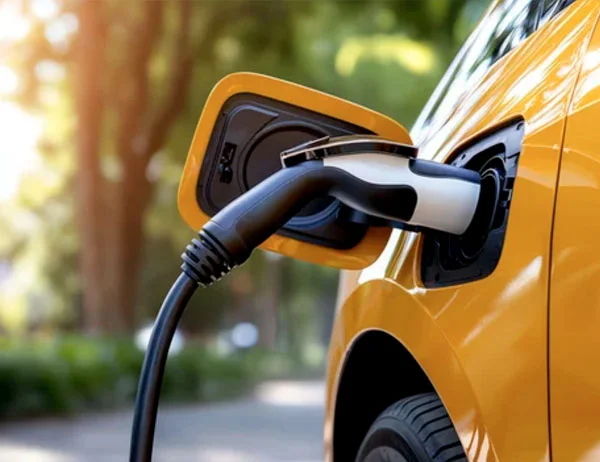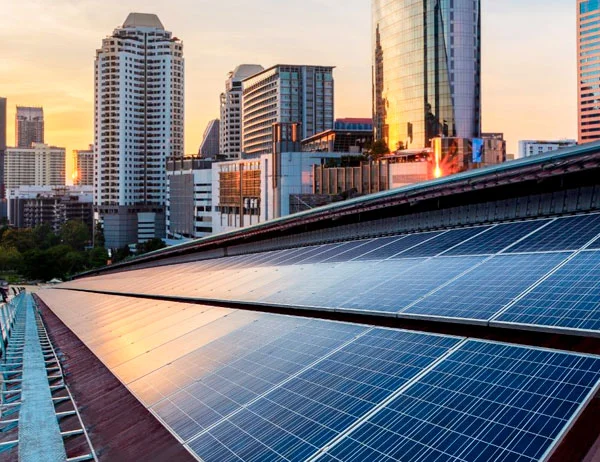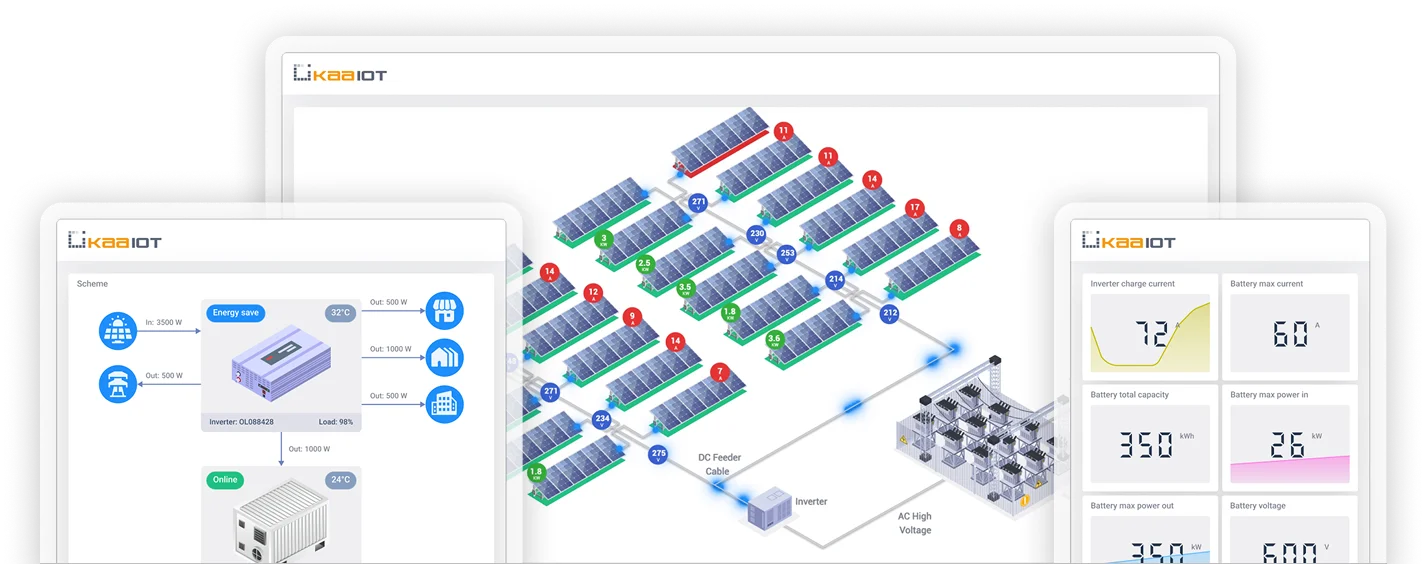Utility-Scale Solar Energy
Management Made Smarter
Real-time safety, compliance, and uptime for solar energy infrastructure
Designed for utility-scale solar energy projects, the Kaa solar energy management system integrates inverters, batteries, loads, and EV fleets into a single intelligent hub. Operators gain continuous insight to cut expenses, maximize uptime, and protect large-scale assets.
Request a demoWho Benefits from Our Solution

Solar power plant operators and investors
Maximize output, protect assets, and boost financial performance with a solar energy monitoring system that delivers real-time visibility, predictive maintenance, and transparent reporting.

Commercial and industrial businesses
Cut energy costs 15–25% with ERP-integrated load management and solar utilization, reducing peak demand up to 30% and achieving ROI in 3–5 years. Optimize self-consumption to cover 40-60% of total electricity needs.

Residential solar system owners
Deliver added value to end users with simple dashboards, proactive alerts, and remote access to solar assets. Increase customer satisfaction and loyalty through smart monitoring.
Core Capabilities

KaaIoT as the central brain
Kaa connects all solar energy assets into a unified smart grid. Operators gain full visibility into system performance, consumption, and storage dynamics.

Real-time data collection & control
Continuous monitoring of inverters, batteries, and loads ensures that no performance anomaly goes unnoticed. Operators can adjust parameters remotely in seconds.

AI-based optimization
Machine learning algorithms optimize energy flows, charge/discharge cycles, and peak shaving strategies, reducing energy costs and prolonging component lifespan.

Forecasting, dashboards & integration
Our energy management system diagram has built-in analytics that delivers alerts, forecasting, customizable dashboards and supports seamless integration with third-party SCADA, ERP, or cloud platforms.
Powerful Features at Your Service
Hardware agnostic integration
KaaIoT integrates with BESS manufacturers like Huawei, Sungrow, and BYD via Modbus, MQTT, or custom APIs. Both new and legacy assets connect seamlessly, avoiding vendor lock-in. Due to this flexibility, users get smooth deployment today and easy upgrades tomorrow, protecting investments while keeping systems future-ready.


Industrial load management with ERP integration
KaaIoT gets informations from ERP systems such as SAP, Power BI, or Microsoft Dynamics to align energy allocation with production schedules. Heavy machinery can shift to low-tariff windows, which cuts peak demand costs without disrupting output. This integration improves efficiency, reduces energy spend, and supports long-term sustainability goals.
Smart charging for EV fleets based on solar generation
KaaIoT connects EV chargers and machinery, then schedules fleet charging to match peak PV production and shifts loads to off-peak tariffs when generation is low. A dedicated mobile app for drivers provides real-time charging status and schedules. This strategy maximizes the value of solar assets, lowers grid pressure, and keeps fleet energy costs at zero.


Load balancing between solar, battery, and grid
KaaIoT AI-driven energy platform helps operators of utility-scale solar plants coordinate electricity flow across PV generation, on-site batteries, and the grid. Using advanced forecasting and analytics, it creates adaptive schedules for charging and dispatch, automatically adjusting to price fluctuations, grid signals, or regulatory changes while ensuring compliance.
All in One Energy Dashboard

The modern energy management dashboard provides full real-time control over the solar power plant and energy storage systems. On a single screen, you can monitor the status of solar arrays, current and voltage indicators, power generation and distribution, as well as the operation of inverters and substations. This approach enables instant anomaly detection, efficiency monitoring, and effective management of energy flows between the grid, batteries, and consumers.
Dedicated dashboard tabs display key KPIs: daily and monthly energy output, performance ratio, equipment availability, as well as battery parameters — charge level, current and voltage, charging speed, and current load. As a result, the owner or operator gains not only detailed analytics but also a practical tool for optimizing energy costs, improving reliability, and reducing expenses.
Reasons to Get Started

Free Trial
Each hardware purchase comes with a 3-month free software trial. Customers can test the platform with zero upfront risk and validate its benefits before committing.

Fast ROI
Predictive maintenance and energy optimization reduce downtime and service costs, enabling measurable ROI within months of deployment.

Developer Support
Dedicated technical assistance helps integrators and OEMs quickly adapt the platform to specific business needs and launch custom monitoring solutions faster.

Remote Access
Through secure VPN connectivity, operators gain real-time diagnostics, OTA firmware updates, and remote configuration, cutting site visits and keeping assets online.
Hardware + Software Subscription Model
Kaa offers a hardware + software subscription model that ensures seamless integration and predictable costs. Each hardware purchase includes a 3-month free trial of the platform, after which customers can select monthly or annual plans. For partners, we provide royalty-based programs that open new revenue streams by bringing IoT-enabled monitoring, predictive maintenance, and remote control into their service portfolios.
Unified IoT Platform for Scalable Solar Energy Management
Managing solar energy systems at scale is never simple. Operators struggle with fragmented data, costly SCADA setups, and limited visibility into remote sites. Businesses with distributed assets often face challenges in balancing consumption, battery storage, and grid interaction. And for installers, meeting customer expectations for reliability and transparency is increasingly difficult.
Kaa solves these issues with a solar energy IoT platform that eliminates vendor lock-in and costly SCADA deployments. Its centralized interface consolidates all energy assets into one solar energy system diagram with customizable dashboards. Users gain remote monitoring, over-the-air updates, and predictive alerts, cutting maintenance costs and avoiding unplanned downtime. For solar energy remote monitoring, the platform enables real-time control, performance tracking, and AI-driven forecasting. Through control of solar energy systems, operators can optimize charge/discharge cycles, adjust loads based on tariff windows, and deploy energy where it matters most. Proactive alerts and robust reporting simplify regulatory compliance and financial oversight.




 Book a demo
Book a demo